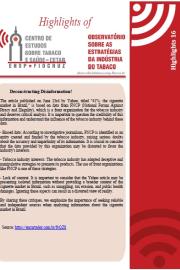
Highlights with topics considered to be of note in order to promote debates and decision-making in the context of tobacco control. In this edition, the agenda deals with: deconstructing the information disseminated by the National Forum Against Piracy and Illegality; The truth about the partnership between Deputy Marcelo Moraes and the tobacco industry; Clearance of Electronic Smoking Devices (EDS): A Threat to Youth Health! and the truth behind ESG strategies: Unmasking the tobacco industry and SindiTabaco.
KORNALEWSKI, Alex Medeiros; CARVALHO, Alexandre Octavio Ribeiro de; BARATA, Danielle; HASSELMANN, Luis Guilherme; TURCI, Silvana Rubano. Destaques do Observatório sobre as Estratégias da Indústria do Tabaco. Cetab/Ensp/Fiocruz, Rio de Janeiro, jul. 2023. Acesso em: 7 jun. 2023.
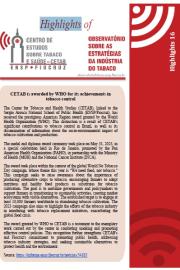
Highlights with topics considered to be prominent in order to promote debates and decision-making in the field of tobacco control. In this edition, the agenda is about: CETAB is awarded by the WHO for its achievements in tobacco control; tobacco industry interference in COP10 and MOP3: a legitimate concern; the tobacco industry and the need for taxation for tobacco control; campaign "The world needs food, not tobacco": promoting alternatives for workers.
KORNALEWSKI, Alex Medeiros; CARVALHO, Alexandre Octavio Ribeiro de; BARATA, Danielle; HASSELMANN, Luis Guilherme; TURCI, Silvana Rubano. Destaques do Observatório sobre as Estratégias da Indústria do Tabaco. Cetab/Ensp/Fiocruz, Rio de Janeiro, jun. 2023. Acesso em: 6 jun. 2023.
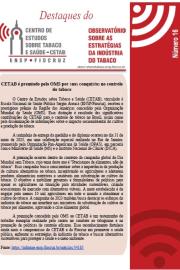
Folheto com os tópicos considerados de destaque com o intuito de promover debates e tomadas de decisão no âmbito do controle do tabaco. Nesta edição, a pauta versa sobre: CETAB é premiado pela OMS por suas conquistas no controle do tabaco; a interferência da indústria do tabaco na COP10 e MOP3: uma preocupação legítima; a indústria do tabaco e a necessidade de tributação para o controle do tabagismo; campanha "O mundo precisa de comida, não de tabaco": fomentando alternativas para trabalhadores.
KORNALEWSKI, Alex Medeiros; CARVALHO, Alexandre Octavio Ribeiro de; BARATA, Danielle; HASSELMANN, Luis Guilherme; TURCI, Silvana Rubano. Destaques do Observatório sobre as Estratégias da Indústria do Tabaco. Cetab/Ensp/Fiocruz, Rio de Janeiro, jun. 2023. Acesso em: 6 jun. 2023.
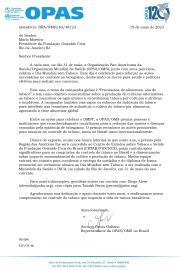
Carta de informe sobre o Prêmio concedido ao Centro de Estudos sobre Tabaco e Saúde (Cetab) da Fundaçao Oswaldo Cruz (Fiocruz).
GALIANO, Socorro Gross. Carta de comunicaçao do prêmio concedido ao Centro de Estudos Sobre Tabaco e Saúde Cetab/Fiocruz. OPAS/OMS, Rio de Janeiro, 19 maio 2023. 1p.
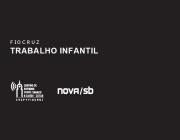
Segundo pesquisa realizadas pela Organização Mundial da Saúde (OMS) em 2011, 1,3 milhões de crianças ao redor do mundo plantam tabaco todos os dias. No Brasil, cerca de 9 mil crianças estavam envolvidas nesta atividade em 2010 (IBGE, 2010). O uso da mão de obra infantil contribuiu para que o país fosse o segundo maior produtor de folhas de tabaco do planeta.
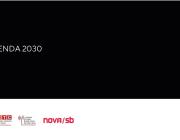
Campanha sobre a agenda 2030, elaborado pelo Cetab/Ensp/Fiocruz em apoio com a Vital Strategeis e Nova/SB.

Campanha sobre contrabando elaborado pelo Cetab/Ensp/Fiocruz em apoio com a Vital Strategeis e Nova/SB.
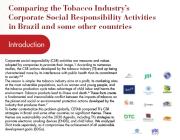
Corporate social responsibility actions (CSR) are measures and values adopted by companies to enhance their image in society. According to numerous studies, when developed by the tobacco industry (IT), these actions end up being characterized more by their interference in public health than by their commitment to society.
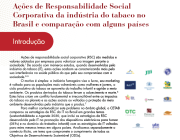
Ações de responsabilidade social corporativa (RSC) são medidas e valores adotados por empresas para valorizar sua imagem perante a sociedade. De acordo com inúmeros estudos, quando desenvolvidas pela indústria do tabaco (IT), estas ações acabam se caracterizando mais pela sua interferência na saúde pública do que pelo seu compromisso com a sociedade.
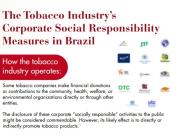
Some tobacco companies make financial donations or contributions to the community, health, welfare, or environmental organizations directly or through other entities. The disclosure of these corporate “socially responsible” activities to the public might be considered commendable. However, its likely effect is to directly or indirectly promote tobacco products.